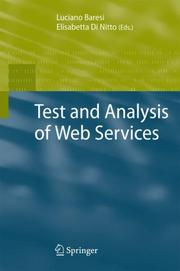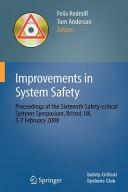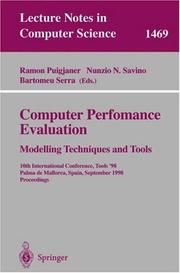| Listing 1 - 10 of 684 | << page >> |
Sort by
|
Book
ISBN: 3030918254 3030918246 Year: 2021 Publisher: Cham, Switzerland : Springer Nature Switzerland AG,
Abstract | Keywords | Export | Availability | Bookmark
 Loading...
Loading...Choose an application
- Reference Manager
- EndNote
- RefWorks (Direct export to RefWorks)
Computer science --- Software engineering --- Computer system failures. --- Computer failures --- Computer malfunctions --- Computer systems --- Failure of computer systems --- System failures (Engineering) --- Fault-tolerant computing --- Failures
Book
ISBN: 1435456440 9781435456440 Year: 2011 Publisher: Boston Cengage Learning
Abstract | Keywords | Export | Availability | Bookmark
 Loading...
Loading...Choose an application
- Reference Manager
- EndNote
- RefWorks (Direct export to RefWorks)
Computer system failures --- Computer systems --- ADP systems (Computer systems) --- Computing systems --- Systems, Computer --- Electronic systems --- Cyberinfrastructure --- Computer failures --- Computer malfunctions --- Failure of computer systems --- System failures (Engineering) --- Fault-tolerant computing --- Evaluation --- Management --- Failures

ISBN: 1281070335 9786611070335 3540729127 3540729119 3642092004 Year: 2007 Publisher: Berlin [Germany] ; New York : Springer,
Abstract | Keywords | Export | Availability | Bookmark
 Loading...
Loading...Choose an application
- Reference Manager
- EndNote
- RefWorks (Direct export to RefWorks)
The service-oriented approach has become more and more popular, now allowing highly integrated and yet heterogeneous applications. Web services are the natural evolution of conventional middleware technologies to support Web-based and enterprise-level integration. The highly dynamic characteristics of service-oriented applications means their validation is a continuous process that often runs in parallel with execution. It is not possible to clearly distinguish between the predeployment validation of a system and its use, nor is it possible to guarantee that the checks passed at a certain time will be passed at a later time and in the actual execution environment as well. Baresi and Di Nitto have put together the first reference on all aspects of testing and validating service-oriented architectures, taking into account these inherent intricacies. The contributions by leading academic and industrial research groups are structured into four parts on: static analysis to acquire insight into how the system is supposed to work; testing techniques to sample its actual behavior; monitoring to probe its operational performance; and nonfunctional requirements like reliability and trust. This monograph is an initial source of knowledge for researchers in both academia and industry in the field of service-oriented architecture validation and verification approaches. They will find a comprehensive survey of state-of-the-art approaches as well as techniques and tools to improve the quality of service-oriented applications.
Web services. --- Web services --- Testing. --- Application software --- Cloud computing --- Software engineering. --- Computer system performance. --- Information Systems Applications (incl. Internet). --- Software Engineering. --- System Performance and Evaluation. --- Computer software engineering --- Engineering --- Application software. --- Computer system failures. --- Computer failures --- Computer malfunctions --- Computer systems --- Failure of computer systems --- System failures (Engineering) --- Fault-tolerant computing --- Application computer programs --- Application computer software --- Applications software --- Apps (Computer software) --- Computer software --- Failures

ISBN: 1281141267 9786611141264 1848001002 1848000995 Year: 2008 Publisher: New York ; London : Springer,
Abstract | Keywords | Export | Availability | Bookmark
 Loading...
Loading...Choose an application
- Reference Manager
- EndNote
- RefWorks (Direct export to RefWorks)
Improvements in System Safety contains the full complement of papers presented at the sixteenth annual Safety-critical Systems Symposium, held at Bristol, UK, in February 2008. The Symposium is for engineers, managers and academics in the field of safety, across all industry sectors, and so the papers included in this volume offer a wide-ranging coverage of major safety issues as well as a good blend of academic research and industrial experience. They include discussions of some of the most recent developments in the field. The first paper reflects a tutorial – on The Safety Case – held on the first day of the Symposium. The subsequent 14 papers are presented under the headings of the Symposium’s sessions: Themes Reprised from SSS ’07; The Safety Case; Safety Culture; Human Factors; Achieving and Improving System Safety; Safety and Risk Analysis. This book will be of interest to both academics and practitioners working in the safety-critical systems arena.
Industrial safety --- Automatic control --- Reliability --- Information Technology --- Software Engineering --- Software engineering. --- Computer system performance. --- Software Engineering. --- System Performance and Evaluation. --- Computer software engineering --- Engineering --- Computer system failures. --- Computer failures --- Computer malfunctions --- Computer systems --- Failure of computer systems --- System failures (Engineering) --- Fault-tolerant computing --- Failures
Book
ISBN: 3319081446 3319081438 Year: 2014 Publisher: Cham : Springer International Publishing : Imprint: Springer,
Abstract | Keywords | Export | Availability | Bookmark
 Loading...
Loading...Choose an application
- Reference Manager
- EndNote
- RefWorks (Direct export to RefWorks)
Current advances in High Performance Computing (HPC) increasingly impact efficient software development workflows. Programmers for HPC applications need to consider trends such as increased core counts, multiple levels of parallelism, reduced memory per core, and I/O system challenges in order to derive well performing and highly scalable codes. At the same time, the increasing complexity adds further sources of program defects. While novel programming paradigms and advanced system libraries provide solutions for some of these challenges, appropriate supporting tools are indispensable. Such tools aid application developers in debugging, performance analysis, or code optimization and therefore make a major contribution to the development of robust and efficient parallel software. This book introduces a selection of the tools presented and discussed at the 7th International Parallel Tools Workshop, held in Dresden, Germany, September 3-4, 2013. .
High performance computing --- Research. --- Computer science. --- Computer system performance. --- Computational Science and Engineering. --- System Performance and Evaluation. --- Computer Applications. --- Informatics --- Science --- Computer mathematics. --- Computer system failures. --- Application software. --- Application computer programs --- Application computer software --- Applications software --- Apps (Computer software) --- Computer software --- Computer failures --- Computer malfunctions --- Computer systems --- Failure of computer systems --- System failures (Engineering) --- Fault-tolerant computing --- Computer mathematics --- Electronic data processing --- Mathematics --- Failures

ISBN: 3540649492 3540680616 Year: 1998 Volume: 1469 Publisher: Berlin, Heidelberg : Springer,
Abstract | Keywords | Export | Availability | Bookmark
 Loading...
Loading...Choose an application
- Reference Manager
- EndNote
- RefWorks (Direct export to RefWorks)
The need to evaluate computer and communication systems performance and dependability is continuously growing as a consequence of both the increasing complexity of systems and the user requirements in terms of timing behaviour. The 10th International Conference on Modelling Techniques and Tools for C- puter Performance Evaluation, held in Palma in September 1998, was organised with the aim of creating a forum in which both theoreticians and practitioners could interchange recent techniques, tools, and experiences in these areas. This meeting follows the predecessor conferences of this series: 1984 Paris 1988 Palma 1994 Wien 1985 Sophia Antipolis 1991 Torino 1995 Heidelberg 1987 Paris 1992 Edinburgh 1997 Saint Malo The tradition of this conference series continued this year where many high quality papers were submitted. The Programme Committee had a di cult task in selecting the best papers. Many ne papers could not be included in the program due to space constraints. All accepted papers are included in this volume. Also, a set of submissions describing performance modelling tools was transformed into tool presentations and demonstrations. A brief description of these tools is included in this volume. The following table gives the overall statistics for the submissions.
Computer systems --- Computer Science --- Engineering & Applied Sciences --- Congresses --- Evaluation --- Computer science. --- Computer system failures. --- Software engineering. --- Computer Science. --- System Performance and Evaluation. --- Software Engineering. --- Computer system performance. --- Computer software engineering --- Engineering --- Computer failures --- Computer malfunctions --- Failure of computer systems --- System failures (Engineering) --- Fault-tolerant computing --- Failures
Book
ISBN: 3319546457 3319546449 Year: 2017 Publisher: Cham : Springer International Publishing : Imprint: Springer,
Abstract | Keywords | Export | Availability | Bookmark
 Loading...
Loading...Choose an application
- Reference Manager
- EndNote
- RefWorks (Direct export to RefWorks)
This practically-focused text/reference presents a comprehensive overview of the present state of the art in Cloud Computing, and examines the potential for future Cloud and Cloud-related technologies to address specific industrial and research challenges. Compiled as a series of selected papers from leading Cloud researchers, this new edition recognizes the relative maturity of Cloud, as offers contrast to the first edition, and explores both established and emergent principles, techniques, protocols and algorithms involved with the design, development, and management of Cloud-based systems. The text reviews a range of applications and methods for linking Clouds, undertaking data management and scientific data analysis, and addressing requirements both of data analysis and also of management of large scale and complex systems. This new edition also extends into the emergent next generation of mobile telecommunications, relating network function virtualization and mobile edge Cloud Computing, as supports emergence of, for example, Smart Grids and Smart Cities. As with the first edition, emphasis continues to be placed on the four quality-of-service cornerstones of efficiency, scalability, robustness, and security. Topics and features: Introduces the essential technical characteristics and concepts behind the new developments in Cloud Computing, including architectural principles, performance evaluation, and quality of service Provides in-depth coverage of how Clouds can be designed to produce scientific insights and analysis, addressing agility, reproducibility, consistency and scalability, and proposing novel techniques and systems Offers an overview of novel approaches in producing scalable, high performance and decentralized Cloud systems, including P2P and graphs systems, to enable fault tolerant, scalable and high performance data intensive Clouds Presents ideas for federation and interoperability across Clouds, and the use of autonomic computing and other intelligent approaches to self-manage the federated Clouds Includes a Foreword by Dr. Omer F. Rana, Professor of Performance Engineering at Cardiff University, UK This authoritative volume will be especially appealing to researchers and students interested in aspects of Cloud Computing research, implementation and deployment. Professional system architects and developers, as well as technical managers and IT consultants, will also find the work to serve as an invaluable reference.
Computer science. --- Computer software --- Computer system failures. --- Computer Science. --- System Performance and Evaluation. --- Performance and Reliability. --- Reusability. --- Cloud computing. --- Electronic data processing --- Web services --- Distributed processing --- Computer system performance. --- Operating systems (Computers). --- Computer operating systems --- Computers --- Disk operating systems --- Systems software --- Operating systems --- Computer software—Reusability. --- Computer failures --- Computer malfunctions --- Computer systems --- Failure of computer systems --- System failures (Engineering) --- Fault-tolerant computing --- Failures
Book
ISBN: 3319926276 3319926268 Year: 2019 Publisher: Cham : Springer International Publishing : Imprint: Springer,
Abstract | Keywords | Export | Availability | Bookmark
 Loading...
Loading...Choose an application
- Reference Manager
- EndNote
- RefWorks (Direct export to RefWorks)
This authoritative and comprehensive handbook is the definitive work on the current state of the art of Biometric Presentation Attack Detection (PAD) – also known as Biometric Anti-Spoofing. Building on the success of the previous, pioneering edition, this thoroughly updated second edition has been considerably expanded to provide even greater coverage of PAD methods, spanning biometrics systems based on face, fingerprint, iris, voice, vein, and signature recognition. New material is also included on major PAD competitions, important databases for research, and on the impact of recent international legislation. Valuable insights are supplied by a selection of leading experts in the field, complete with results from reproducible research, supported by source code and further information available at an associated website. Topics and features: Reviews the latest developments in PAD for fingerprint biometrics, covering optical coherence tomography (OCT) technology, and issues of interoperability Examines methods for PAD in iris recognition systems, and the application of stimulated pupillary light reflex for this purpose Discusses advancements in PAD methods for face recognition-based biometrics, such as research on 3D facial masks and remote photoplethysmography (rPPG) Presents a survey of PAD for automatic speaker recognition (ASV), including the use of convolutional neural networks (CNNs), and an overview of relevant databases Describes the results yielded by key competitions on fingerprint liveness detection, iris liveness detection, and software-based face anti-spoofing Provides analyses of PAD in fingervein recognition, online handwritten signature verification, and in biometric technologies on mobile devices Includes coverage of international standards, the E.U. PSDII and GDPR directives, and on different perspectives on presentation attack evaluation This text/reference is essential reading for anyone involved in biometric identity verification, be they students, researchers, practitioners, engineers, or technology consultants. Those new to the field will also benefit from a number of introductory chapters, outlining the basics for the most important biometrics.
Biometric identification --- Computer system performance. --- Biometrics. --- Computer science. --- System Performance and Evaluation. --- Probability and Statistics in Computer Science. --- Informatics --- Science --- Computer system failures. --- Biometrics (Biology). --- Mathematical statistics. --- Computer failures --- Computer malfunctions --- Computer systems --- Failure of computer systems --- System failures (Engineering) --- Fault-tolerant computing --- Mathematics --- Statistical inference --- Statistics, Mathematical --- Statistics --- Probabilities --- Sampling (Statistics) --- Biological statistics --- Biology --- Biometrics (Biology) --- Biostatistics --- Biomathematics --- Failures --- Statistical methods
Book
ISBN: 3662436108 3662436094 Year: 2014 Publisher: Berlin, Heidelberg : Springer Berlin Heidelberg : Imprint: Springer,
Abstract | Keywords | Export | Availability | Bookmark
 Loading...
Loading...Choose an application
- Reference Manager
- EndNote
- RefWorks (Direct export to RefWorks)
This book constitutes the proceedings of the first Asia Pacific Requirements Engineering Symposium, APRES 2014, held in Auckland, New Zealand, in April 2014. The 16 papers presented were carefully reviewed and selected from 30 submissions. The focus of the papers is on the following topics: novel ideas, methods, tools, and techniques for improving and enhancing Requirement Engineering products and processes.
Requirements engineering --- Requirements analysis --- Requirements capture --- Requirements gathering --- Requirements specification --- Engineering --- Specifications --- Software engineering. --- Computer system performance. --- Computer software. --- Software Engineering. --- System Performance and Evaluation. --- Algorithm Analysis and Problem Complexity. --- Software Engineering/Programming and Operating Systems. --- Software, Computer --- Computer systems --- Computer software engineering --- Computer system failures. --- Algorithms. --- Algorism --- Algebra --- Arithmetic --- Computer failures --- Computer malfunctions --- Failure of computer systems --- System failures (Engineering) --- Fault-tolerant computing --- Foundations --- Failures
Book

ISBN: 9783319160122 3319160117 9783319160115 3319160125 Year: 2015 Publisher: Cham : Springer International Publishing : Imprint: Springer,
Abstract | Keywords | Export | Availability | Bookmark
 Loading...
Loading...Choose an application
- Reference Manager
- EndNote
- RefWorks (Direct export to RefWorks)
Numerical simulation and modelling using High Performance Computing has evolved into an established technique in academic and industrial research. At the same time, the High Performance Computing infrastructure is becoming ever more complex. For instance, most of the current top systems around the world use thousands of nodes in which classical CPUs are combined with accelerator cards in order to enhance their compute power and energy efficiency. This complexity can only be mastered with adequate development and optimization tools. Key topics addressed by these tools include parallelization on heterogeneous systems, performance optimization for CPUs and accelerators, debugging of increasingly complex scientific applications, and optimization of energy usage in the spirit of green IT. This book represents the proceedings of the 8th International Parallel Tools Workshop, held October 1-2, 2014 in Stuttgart, Germany – which is a forum to discuss the latest advancements in the parallel tools.
Mathematics. --- Computational Science and Engineering. --- System Performance and Evaluation. --- Computer Applications. --- Computer system performance. --- Computer science. --- Mathématiques --- Informatique --- Mathematics --- Physical Sciences & Mathematics --- Mathematics - General --- High performance computing --- Computer system failures. --- Application software. --- Computer mathematics. --- Informatics --- Science --- Application computer programs --- Application computer software --- Applications software --- Apps (Computer software) --- Computer software --- Computer failures --- Computer malfunctions --- Computer systems --- Failure of computer systems --- System failures (Engineering) --- Fault-tolerant computing --- Computer mathematics --- Electronic data processing --- Failures
| Listing 1 - 10 of 684 | << page >> |
Sort by
|

 Search
Search Feedback
Feedback About UniCat
About UniCat  Help
Help News
News